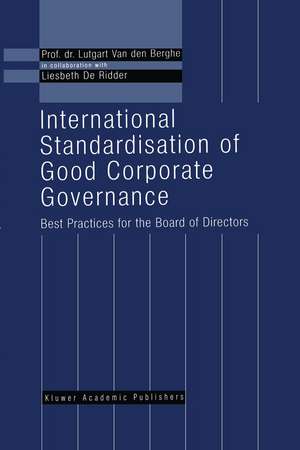International Standardisation of Good Corporate Governance: Best Practices for the Board of Directors
Liesbeth De Ridder Autor L. van den Bergheen Limba Engleză Paperback – 21 dec 2012
The AoD also aims to use the interaction between the academic and the business world to change the environment in which companies work. This task is realised in different ways: by conducting applied scientific research, creating a large pool of professional experience and networking within the AoD, confronting these research results with the practical experience of the members, publishing these results, and organising training programmes. The AoD therefore collaborates very closely with the academic world. The Vlerick School of Management was the co-founder of the AoD, together with a great number of national and international business partners. The foundation of the AoD goes back to the initiative of its president, Mr. L.H. Verbeke (Loeff Claeys Verbeke). He was convinced that the increasing international interest in corporate governance would also affect Belgian companies, but that there was a need for an `indigenous coherent' view of corporate governance. Being at the cross-roads of different cultures and languages and at the same time being a very open economy, Belgium could not simply copy another country's code on good corporate governance. Therefore the initiative was taken to set up a broad international overview of the best practices for the board of directors, which is presented in this volume.
This analysis is not only oriented towards the `famous' codes but aims to highlight as well the practical applications and problems faced in implementing these suggestions. Consequently special attention is given to the best practices for family businesses and medium-sized companies.
| Toate formatele și edițiile | Preț | Express |
|---|---|---|
| Paperback (1) | 942.31 lei 6-8 săpt. | |
| Springer Us – 21 dec 2012 | 942.31 lei 6-8 săpt. | |
| Hardback (1) | 947.98 lei 6-8 săpt. | |
| Springer Us – 30 ian 1999 | 947.98 lei 6-8 săpt. |
Preț: 942.31 lei
Preț vechi: 1149.16 lei
-18% Nou
Puncte Express: 1413
Preț estimativ în valută:
180.31€ • 188.74$ • 150.08£
180.31€ • 188.74$ • 150.08£
Carte tipărită la comandă
Livrare economică 31 martie-14 aprilie
Preluare comenzi: 021 569.72.76
Specificații
ISBN-13: 9781461373629
ISBN-10: 146137362X
Pagini: 248
Ilustrații: VIII, 237 p.
Dimensiuni: 160 x 240 x 13 mm
Greutate: 0.35 kg
Ediția:Softcover reprint of the original 1st ed. 1999
Editura: Springer Us
Colecția Springer
Locul publicării:New York, NY, United States
ISBN-10: 146137362X
Pagini: 248
Ilustrații: VIII, 237 p.
Dimensiuni: 160 x 240 x 13 mm
Greutate: 0.35 kg
Ediția:Softcover reprint of the original 1st ed. 1999
Editura: Springer Us
Colecția Springer
Locul publicării:New York, NY, United States
Public țintă
ResearchDescriere
In International Standardisation of Good Corporate Governance - Best Practices for the Board of Directors the Academy of Directors (AoD) presents a multidisciplinary approach for the governance of a company.
The AoD also aims to use the interaction between the academic and the business world to change the environment in which companies work. This task is realised in different ways: by conducting applied scientific research, creating a large pool of professional experience and networking within the AoD, confronting these research results with the practical experience of the members, publishing these results, and organising training programmes. The AoD therefore collaborates very closely with the academic world. The Vlerick School of Management was the co-founder of the AoD, together with a great number of national and international business partners. The foundation of the AoD goes back to the initiative of its president, Mr. L.H. Verbeke (Loeff Claeys Verbeke). He was convinced that the increasing international interest in corporate governance would also affect Belgian companies, but that there was a need for an `indigenous coherent' view of corporate governance. Being at the cross-roads of different cultures and languages and at the same time being a very open economy, Belgium could not simply copy another country's code on good corporate governance. Therefore the initiative was taken to set up a broad international overview of the best practices for the board of directors, which is presented in this volume.
This analysis is not only oriented towards the `famous' codes but aims to highlight as well the practical applications and problems faced in implementing these suggestions. Consequently special attention is given to the best practices for family businesses and medium-sized companies.
The AoD also aims to use the interaction between the academic and the business world to change the environment in which companies work. This task is realised in different ways: by conducting applied scientific research, creating a large pool of professional experience and networking within the AoD, confronting these research results with the practical experience of the members, publishing these results, and organising training programmes. The AoD therefore collaborates very closely with the academic world. The Vlerick School of Management was the co-founder of the AoD, together with a great number of national and international business partners. The foundation of the AoD goes back to the initiative of its president, Mr. L.H. Verbeke (Loeff Claeys Verbeke). He was convinced that the increasing international interest in corporate governance would also affect Belgian companies, but that there was a need for an `indigenous coherent' view of corporate governance. Being at the cross-roads of different cultures and languages and at the same time being a very open economy, Belgium could not simply copy another country's code on good corporate governance. Therefore the initiative was taken to set up a broad international overview of the best practices for the board of directors, which is presented in this volume.
This analysis is not only oriented towards the `famous' codes but aims to highlight as well the practical applications and problems faced in implementing these suggestions. Consequently special attention is given to the best practices for family businesses and medium-sized companies.
Cuprins
Introductory Considerations Regarding the Research Methodology. Synthesis and Final Conclusions. Part I: Corporate Governance: In Search of the Correct Frame of Reference. 1. Standardisation Regarding Corporate Governance? 2. Corporate Governance: Relevance of the Debate. 3. Corporate Governance: In Search of a Useful Definition. 4. Corporate Governance in a Historical Perspective. 5. Corporate Governance in a Geographical Perspective. 6. Systematising the Relevant Determining Factors and Optional Issues Regarding Sound Governance. 7. Is There Greater Convergence Between the Different Systems of Corporate Governance. Part II: Corporate Governance Standards and Codes: A Comparative International Analysis. 8. Type of Recommendations and Enforceability. 9. Management versus Board of Directors. 10. Independence of Directors. 11. Other Provisions Concerning the Composition of the Board of Directors. 12. An Effective Operation of the Board of Directors. 13. Committees within the Board of Directors. Part III: Detailed Analysis of the International Comparison of the Corporate Governance Codes, Standards and Recommendations. 14. Background to Sources. 15. Type of Recommendations and Enforceability. 16. Management versus Board of Directors. 17. Independence of Directors. 18. Other Provisions Regarding the Composition of the Board of Directors. 19. Operation of the Board of Directors. 20. Committees within the Board of Directors. Appendix: References of the International Comparison ofCodes, Standards and Recommendations: Abbreviations. Bibliographical References. Index.

















